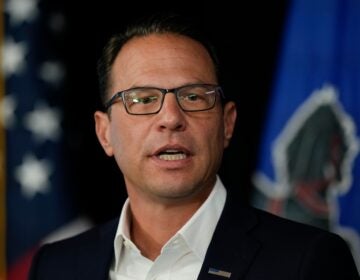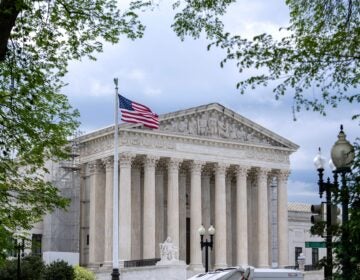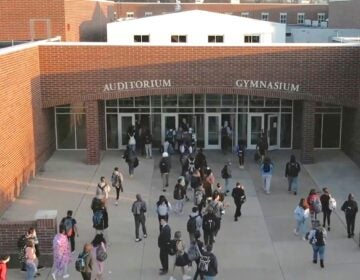State, teachers’ union reluctant on more money for Philly schools
Yesterday, Philadelphia Mayor Nutter announced his plan to raise $95 million for the city’s struggling School District, mostly through tax hikes on cigarettes and alcohol.
But even if that money comes through, city schools will still be looking for an additional $120 million from Harrisburg and $133 million in givebacks from the local teacher union.
Sen. Mike Folmer (R-Lebanon), who chairs the Senate’s education committee, said the unions have to go first.
“Philadelphia is trying to care of their business at home,” Folmer said. “They’re looking at concessions and such. Get that done, and then we’ll see what needs to be done in additional [state] funding.”
Not surprisingly, Philadelphia Federation of Teachers president Jerry Jordan has a different view.
“To come and ask us now to bear the brunt of taking pay cuts in order to balance the budget, I mean, that’s just wrong,” Jordan said. “We need the state to not only provide adequate funding. We need the state to provide a funding formula … so we are not in this spot every year.”
Philadelphia district officials, facing a $304 million budget shortfall for next year, say they need a “shared sacrifice” in order to prevent schools from opening in September with no guidance counselors, librarians, secretaries, assistant principals, gifted programs, supply budgets and sports.
Even coming up with the city’s portion of the district’s request will be difficult. Passing the state legislation needed for the city to tax cigarettes, hike its liquor-by-the-drink tax, and place liens on the out-of-county properties of individuals who own delinquent properties in Philadelphia is not a sure thing.
And that’s the easy part.
Tight times in Harrisburg
Nutter, who has made several trips to Harrisburg on the district’s behalf, said lawmakers there have noticed that the School District has closed schools, slashed its central office, and extracted huge concessions from its lowest-paid workers in order to shore up its budget.
“The [School Reform Commission] and [Superintendent] Dr. Hite are getting very, very high reviews because of the tough and difficult choices that they are making,” Nutter said.
But even some state lawmakers who acknowledge those steps, including Folmer, still remain skeptical of sending more money to Philadelphia schools.
“Somehow, we’ve got to get this educational industrial complex that we created under control,” said Folmer. “The question is, ‘Do we restore funding, or do we have the guts to look at existing spending and prioritize how we’re doing that spending?'”
Just finding the money in Harrisburg could be difficult, said Erik Arneson, a spokesman for Pennsylvania Senate Republicans.
Pennsylvania’s Independent Fiscal Office recently estimated that the state will be $220 million short by the end of the year, said Arneson.
And with school districts across the state struggling, he argued, it’s implausible to give money to Philadelphia schools alone.
Arneson acknowledged that one possible way to generate some funds would be to restore the so-called “charter reimbursement,” cut by Gov. Corbett two years ago.
But coming up with the full $120 million requested by the SRC is probably not a realistic outcome, he said: “From my position, sitting here today, I don’t see how it can be achieved.”
‘Shared sacrifice’
Making matters even more complicated, some key leaders in Harrisburg want distribution of whatever state money is found to be contingent on an overhaul of the school district’s contract with its teachers.
“There won’t be any more money for the status quo. There can’t be,” said Charles Zogby, Gov. Corbett’s budget secretary.
Jordan of the Philadelphia Federation of Teachers bristled at that stance. He said teachers should not be held responsible for closing the district’s budget gap.
“The PFT has never had a part in the district’s budgeting, nor have we had any say in spending,” Jordan said. “The PFT did not create these deficits.”
Jordan also rejected the notion of “shared sacrifice” espoused by the district. He said Philadelphia teachers currently make less than their suburban counterparts despite working under tougher conditions, regularly spend hundreds of dollars out of pockets to improve their classrooms, and already made substantial concessions to help ease the district’s budget woes in recent years.
“The PFT has been engaged in ‘shared sacrifice’ with the school district for a number of years,” Jordan said. “Unfortunately, the sacrifices that have taken place do not help children.”
The finger-pointing and feet dragging elsewhere isn’t likely to sit well with members of City Council, who already feel burned after coming up with millions for the district in each of the last two years, only to see the state’s contribution go down.
“At the end of the day, there continues to be this underlying issue, the ‘gorilla in the room,'” Council President Darrell Clarke said yesterday after Nutter’s announcement. “Where are the additional dollars that will come from the state of Pennsylvania?”
—
This story was reported through a partnership in education coverage between WHYY/NewsWorks and the Public School Notebook. Dale Mezzacappa contributed reporting.
WHYY is your source for fact-based, in-depth journalism and information. As a nonprofit organization, we rely on financial support from readers like you. Please give today.




